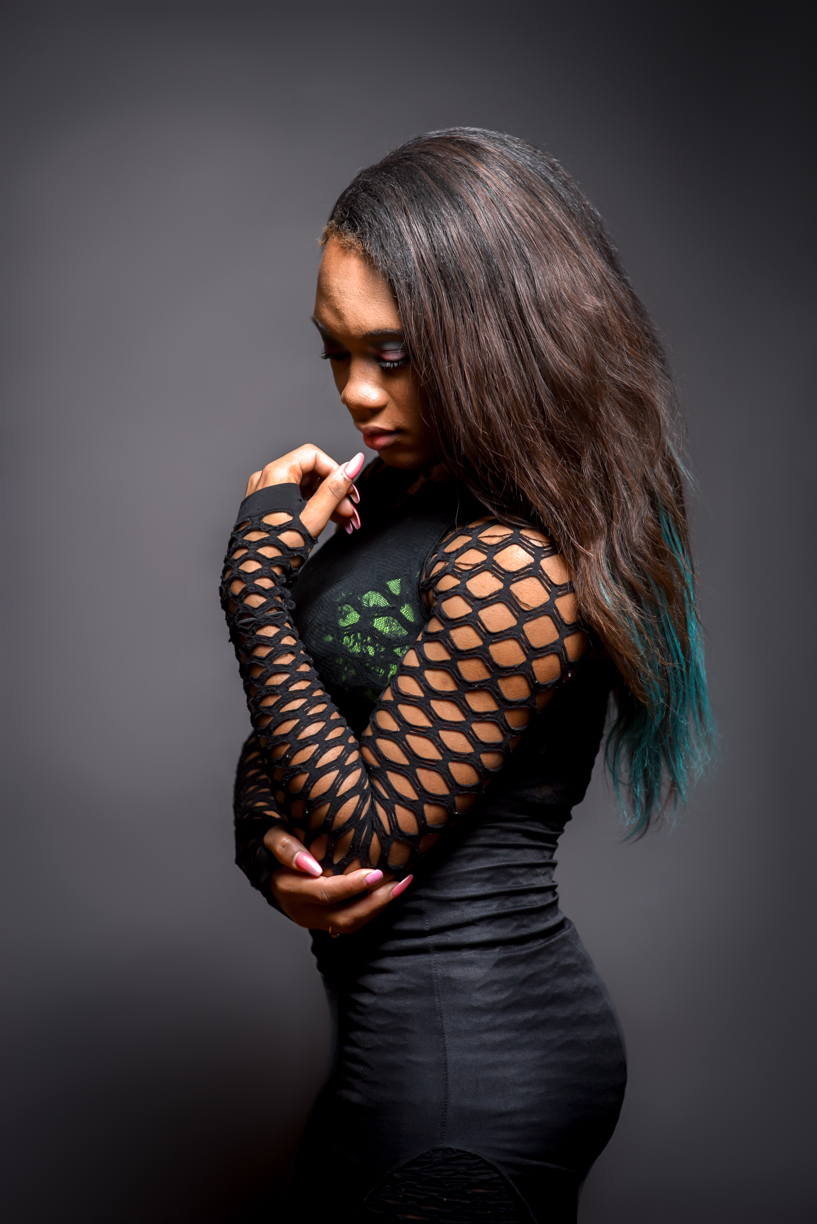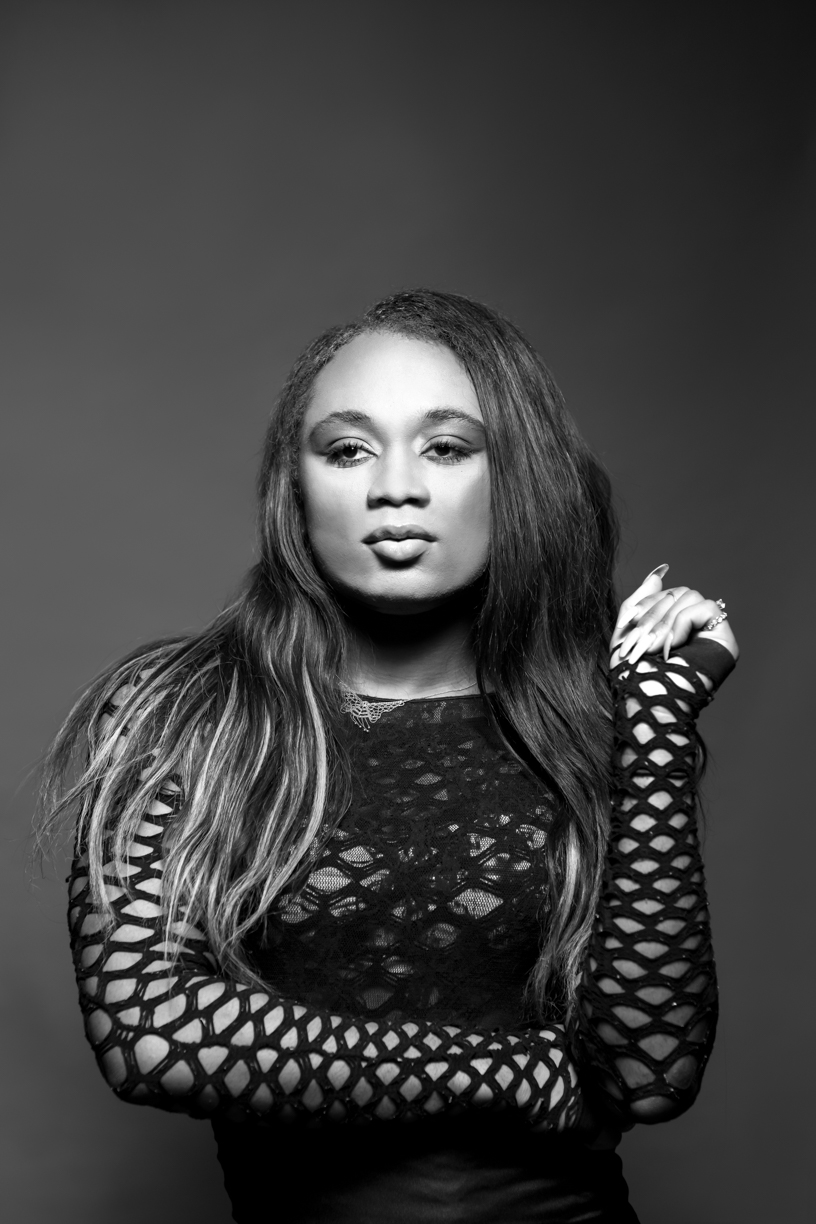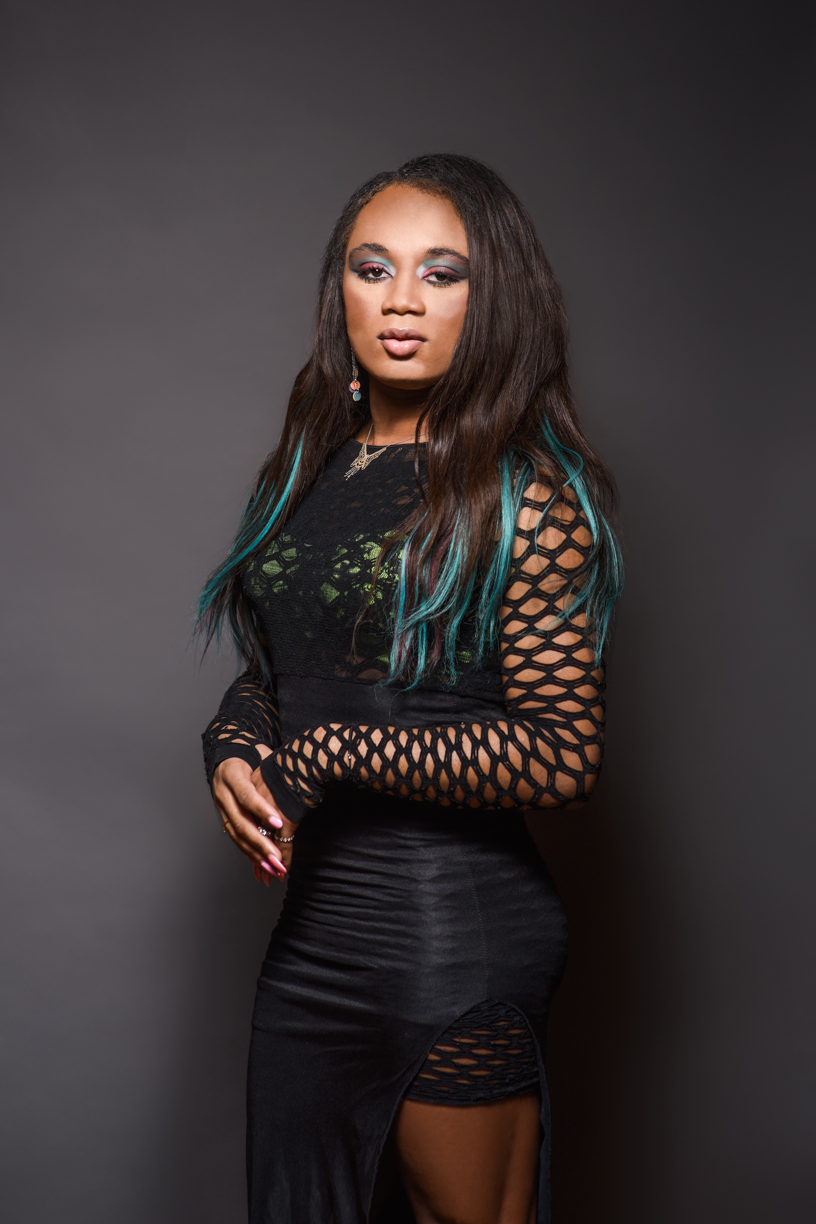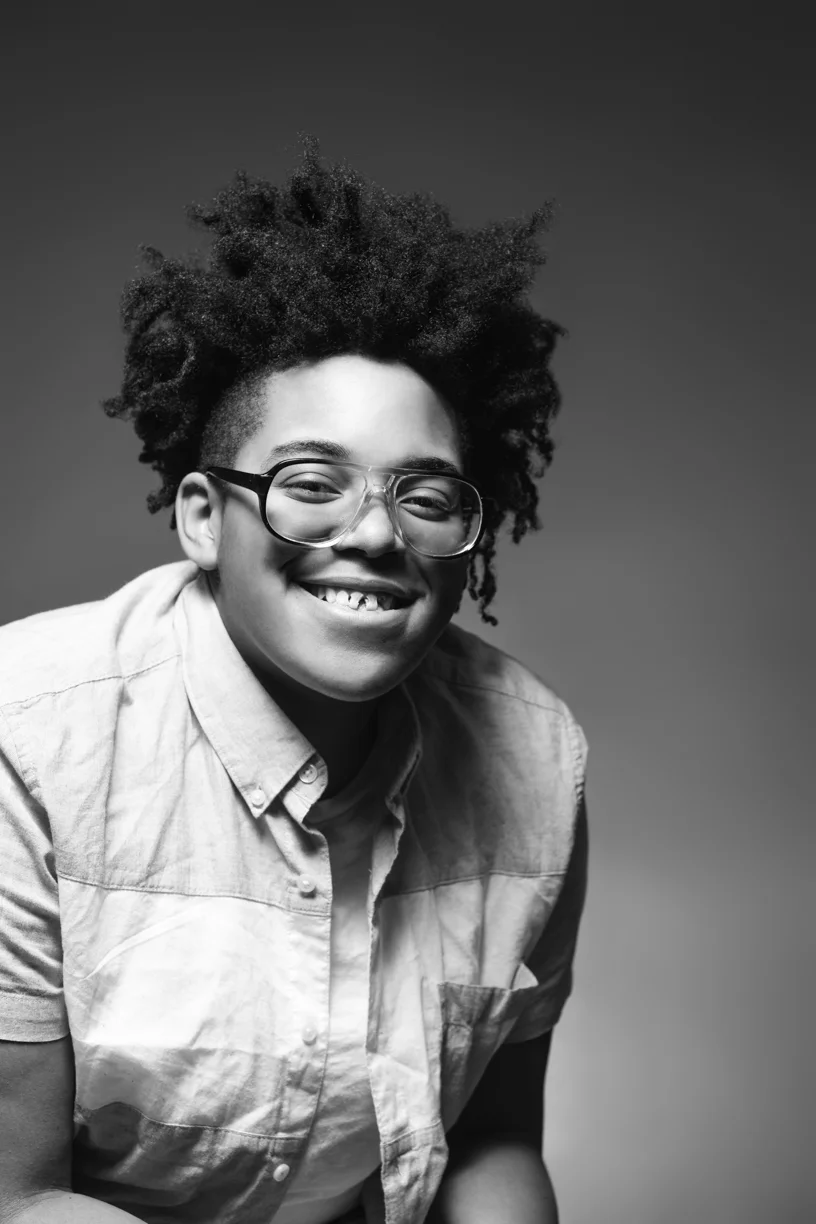


By her TWELFTH birthday, Rylee Jackson knew the sharp sting of loss. Now, she's counting her blessings, and learning to dance through the wreckage.
Rylee Jackson is a dancer. As a kid, she spun through the kitchen while her mother made dinner, twirling to the pulse of a thousand little beats buzzing with electrical current.
Back then, before her mother died, Rylee was still safe from loss. She was bright and fearless—a born talent.
Rylee clicks one pink nail against the rim of a mug, tapping out the cadence of a prayer, or the slow rhythm of forbearance. She tells me God built her this way; that He always intended for her to be a dancer and a writer. She tells me that nothing about her is an accident; because God makes no mistakes.
When I ask Rylee about where she grew up, she clicks her tongue, searching for the facts of her life beneath the debris. It takes a half-dozen clicks for her to answer. She grew up in Akron, she tells me. But then it gets complicated.
Rylee lived in an old house on Aqueduct, where her mother gave her the space to find comfort in her own identity—letting her dress in heels and pink robes, twirling in front of the mirror.
“Every Saturday, my mother would dance around the house,” Rylee says—she and her brothers singing into the ends of mops and brooms like microphones—transforming chores into full-scale choreographed productions.
“That was my family,” says Rylee, a subtle change in her voice; the soft inflection of an old wound reopened. “That’s just how we were.”
Rylee’s mother died when she was eleven, and then much of her life became about learning to trust the intangible, and learning to build a life inside of it. She learned to live with the unshakeable thought that every bit of joy or comfort she could capture would only ever be transient.
Rylee learned to keep moving. And in the end, that might have been what saved her—the visceral urge to carry on—the compelling hope that she might find herself, and her God, in the most unlikely of places: in foster homes or dance clubs, in her own handwriting scrawled between the blue lines of a spiral notebook.
Even now, after a dozen foster homes, four high schools, and more than a handful of good things swallowed up by distance, Rylee says she’s blessed.
She glances over one shoulder at her boyfriend, Russell. His glasses are held together at the hinge with a roll of neon green tape, and the ends of his blonde hair stick out from beneath a winter hat. Russell smiles, and Rylee gestures to him with a nod.
“Ask Russell,” she says, “and he’ll tell you. I still dance like I did when I was a kid." Rylee blinks, and her eyeshadow sparkles under the dim lights. Russell will tell you,” she says. “I still dance even when there’s no music.”
The day after Rylee’s mother died, she and her brothers left that old house on Aqueduct to live with their aunt across town.
Rylee’s uncle was a pastor, and she and her brothers fell into the fold of his church. Rylee tells me her aunt and uncle did everything they could, but they had four children of their own. And within a few years, Rylee and her brothers slipped into the foster care system.
I mean a lot to myself; enough for me to never allow anyone to disrespect me for who I am. It’s just the kind of backbone you get when you’ve had to do so much on your own.
“At first they kept us together,” Rylee says. “But everybody learns to cope differently. I just got quiet,” she says. “But they started acting out.”
While Rylee spent hours alone in her bedroom, her brothers found themselves caught in a whirlwind of street violence.
“They ended up separating us,” Rylee tells me. “Because they had no choice.”
After that, some part of Rylee went missing. She wraps her hands around a mug filled with hot chocolate, her elbows tucked in close to her stomach. “I’ve always believed in God,” she tells me. “And looking back, I can see that He’s been with me.”
Russell, she says, is a big part of the reason she can see it all more clearly. She tells me they knew each other as kids. Their parents were friends, and they have a few photos together: They’re both eight or nine, crowded in front of a disposable camera with the other kids from their neighborhood. In the photos, Rylee looks like a little boy—but she never felt like one. She didn’t have the right words to speak herself into the world just yet; and wouldn’t for a long time.
Rylee and Russell are bound by a particular kind of loss. They are no strangers to that incessant ache; or the sleepless hurt of missing something—or someone—you can’t ever get back.
“A lot of bad things happened to me,” Russell says. “I was pretty lost.”
And for a long time, so was Rylee. “I was never stable,” she tells me, flipping her hair behind one shoulder with the back of her hand. “And people just don’t understand,” she says. “They don’t get what that kind of thing does to you.”
Stuck in an upending cycle of constant grief, Rylee never had much time to unpack her identity. She tells me she never had the language to name who she was.
“I just thought I was gay,” she says. “I never even heard the word transgender.”
Rylee switched schools every other semester, learning to live with only what she could carry. She bounced from one foster home to another. And in the face of unimaginable loss—alone, and debilitated by depression and dysphoria—she scribbled novels into spiral notebooks.
“People wanted to read them,” she tells me. “So I wrote them in notebooks and passed them around.” Rylee smiles. “I just kept writing,” she says, “because everybody wanted to know what would happen.”
Rylee outlines the plot of those novels, and Russell rocks to the edge of his seat. He’s read every book a dozen times over.
When Rylee tells me about her characters—how they’re bound by a secret power they’ve each inherited, drawn together by the shared burden of immense responsibility—Russell raises an index finger to interject. He knows these characters, and he loves them. “You see each character grow,” Rylee tells me. “And you see them make questionable decisions.”
“They’re not perfect,” Russell says. “But they’re human.”
Rylee tells me one character’s powers make her question her belief in God.
“She’s basically a Phoenix,” Russell adds, talking with his hands, his head bobbing over Rylee’s shoulder. “She can die,” he tells me, “and come back to life again.”
Russell pauses, shaking his head, and Rylee lets him tell the story.
“I never had someone to tell me I was doing okay,” Rylee says, looking at Russell over her shoulder. “I just had to do that for myself.”
That is, until she met her mothers. Child Protective Services placed Rylee with them when she was seventeen. With the love and space to bloom, they helped her find the right language to express herself.
“If they hadn’t come into my life,” says Rylee, “I most likely still wouldn’t fully understand what’s going on with me.”
They helped Rylee find support groups, and she slowly came out as a transgender woman; in her time, and on her own terms. With them, Rylee finally emerged from the shadow and daze of years in the system. She even came out to her brothers, who had a hand in choosing her name.
“I was finally comfortable with myself,” she says. “Because I finally learned about who I really was.”
At her graduating high school, the administration called her to the office. “They told me they knew what was going on,” Rylee says. “And they told me I was safe.”
The way I look makes me safer. I want that to be out in the light. I’ve been more accepted than people who don’t pass, and I don’t think that’s fair.
She tells me coming out, and her transition, wasn’t ever about hating who she was before. It was, and still is, about loving herself enough to be the person she was always meant to be, even in the face of violence or discrimination. Even at the risk of losing everything.
But when Child Protective Services discovered that Rylee identified as a young woman, they moved her to another home. There, she couldn’t present in a way that aligned with her gender identity, and she couldn’t use female pronouns.
"It was so hard,” Rylee tells me. “Because I knew who I was. I knew that I was transgender, and I just couldn’t be myself anymore.”
For more than a year, Rylee, like so many other LGBTQIA+ youth in the system, lived in a home that was non-affirming of her identity. Only four states have statutes in place that require trans and gender non-conforming youth to be placed in care that affirms their gender identities.
Ohio’s Administration through Social Services policy technically protects trans and gender non-conforming kids from discrimination within the system, but that language doesn’t cover freedom of gender expression. And those policies are inconsistently implemented, negated, or ignored entirely.
LGBTQIA+ identified youth are dramatically over-represented within the foster care system. And they often end up running away from their foster families or group homes for the very same reasons they were placed in out-of-home care to begin with: physical, emotional, or psychological abuse—emotional neglect, addiction, or violence directly related to their identities.
Rylee didn't end up in the system as a direct result of her gender identity. But nevertheless, she had to navigate a series of homes and families who refused to accept her gender expression. In the year she spent living in that non-affirming household, Rylee says she thought of her foster mothers every day. She never stopped wishing she was with them.
“I was the most myself when I was with them,” Rylee says. “I thought about them every single day.”
When Rylee aged out of the system a year later, her moms took her to dinner. They told her they wanted to help her change her name. And then they told her they wanted to adopt her.
Rylee says God’s hand guided her through the spots where her lungs were sucked empty by the loneliness or loss. She tells me her mothers and her novels and dance helped her find her way back to the God she knew as a child, and to herself. She tells me it's all part of some plan.
“He placed me with them for a reason,” Rylee says. “He brought me to my moms so I could find myself.”
In the videos, Rylee is always front and center. The brim of a hat pulled low over her eyes, she runs through every choreographed move with soulful precision.
Her dance group was a way to transfer the sense of empowerment she’d finally found in herself. “I just wanted to show other girls and women that they could do this too.”
Rylee had been performing alone, but she had a vision. She auditioned other girls to dance with her, and they called themselves Rylee and the Rosez. She tells me they practiced every night after working long shifts in food service and retail. “I believed in that group,” Rylee tells me. “And I put everything I had into making it work.”
The girls got a manager and played shows all over Ohio. They even booked a mini club tour. But after the tour’s first show, their third member died.
It was sudden. There were no warning signs. When Rylee tells me this, there’s a scratch in her voice—another moment of her life punctuated by the dull thud of loss.
“We just couldn’t do it after that,” she tells me. “We tried to play the other shows, but we couldn’t. It just didn’t work without her.”
Rylee can’t seem to escape the sting of that loss, and all the other losses like it. She tells me she’s learning to remember each one with reverence; to look back with joy and gratitude for what once was. It’s not always easy, she tells me. But it’s gotten better.
Every year, Rylee throws a party for her mother’s birthday. This year, Russell cooks for everyone; and for the first time, Rylee’s grandparents come. She describes the chaotic joy; each of her friends hugging her grandmother. She almost tears up at the memory of her chosen family embracing her grandmother so perfectly on the day her mother was born.
There is a kind of joy in Rylee’s voice talking about the party, a soft happiness—subdued—the kind of pale comfort one only receives with the passage of time.
Rylee’s mother has been dead for more than ten years. She never knew about Rylee’s identity or her transition, and Rylee tells me she sometimes wonders what her mother might think of her life now.
“So I asked my grandmother if she thought my mother would’ve supported me,” Rylee says, smiling. “And she told me that my aunt used to criticize my mom for letting me wear dresses, or letting me play with makeup. She used to tell my mom to make me stop.”
Her grandmother told her that her mom defended her. That she loved her exactly as she was, in the heels and the lipstick, dancing and singing on cleaning day. Rylee’s face opens up in a glow.
Rylee’s friends eat the meal Russell cooked for them. They celebrate Rylee’s mother’s life, not because they knew her, but because she gave them Rylee. In the photos, Rylee’s grandmother is smiling, and so is Russell, spoon in hand, standing at the kitchen counter.
Intimate Partner Violence Among Black Transgender Women
Employment and Poverty Rates Among Trans and Gender Non-conforming People
Sexual Assault Among Black Transgender Women
Job, housing, and economic instability affect transgender women of color deeply and pervasively. Because trans women of color exist at the dangerous and painful intersections of racism, homophobia, transphobia, and transmisogyny, they’re particularly vulnerable to violence, harassment, and discrimination.
Transgender women of color are more likely to experience sexual assault, poverty, addiction, homelessness, negative health outcomes, incarceration, and violence at the hands of law enforcement. They're also more likely to experience violence, harassment, and discrimination within the workplace and in job and housing markets than their white transgender peers.
Black, Latinx, and Indigenous transgender women are among the most vulnerable populations in the world, and it's important to remember that they live at the intersections of multiple identities, and their experience of systemic violence is also influenced by class, ethnicity, level of education, ability, religion, nationality, and sexual orientation.
For instance, transgender women of color experience incarceration as a result of discrimination at disproportionately high rates. Most states require that transgender people be placed in jails and juvenile justice facilities according to the gender assigned to them at birth, meaning trans women are often housed in men's facilities, which leaves them vulnerable to assault.
Often, trans women of color live on a household income of under $10,000, and are unable to access legal aid. As a result, they might remain unjustly incarcerated for months on end, losing their jobs and housing.
Because trans people are largely unprotected from housing and job discrimination by law, it may be extremely difficult for transgender women of color to find safe housing and employment when they are finally released. These interconnected systems of violence dehumanize and devalue trans and gender non-conforming people of color. Race, ability, and class inform one another, and often leave trans women of color with few options, little support, and no social safety nets.
If you or a loved one are a young trans, non-binary, or gender non-conforming person navigating the foster care system, the Silvia Rivera Law Project may be able to help.
“The hardest thing for me is getting a job,” Rylee says. “I love waitressing,” she tells me. “But the last two serving jobs I had, I believe I was fired because I’m transgender.”
Rylee tells me she was hostessing on a night shift when a man stumbled in drunk with his friends. Before she could even greet them, he asked Rylee “what [she] was.” She politely ignored him.
He taunted her from the table. His friends, obviously embarrassed, couldn’t control his behavior, and finally Rylee asked the drunk customer why her gender identity was even up for discussion. She was frustrated, she tells me, but she wasn’t mean.
“He must have called corporate,” she tells me, glancing at Russell. “They told me the incident was under investigation, but they never asked me for a statement. I’ll never know what that man said about me. And I’ll never have a chance to say what really happened.”
After weeks of suspension, and no update or contact, Rylee began looking for another job. Her employer never contacted her to let her know that her employment had been terminated, and she was never updated on the status of the investigation.
At another serving job, Rylee was harassed by another drunk customer. She played it off, but the hiring manager was there to witness it. “He mentioned that when he hired me,” Rylee says, “he had no idea that I was transgender.”
Rylee didn’t give the comment much weight. She passes well, and often the people she works with never know she’s transgender. “But three days later,” she says, “my manager fired me.”
Rylee’s identity as a trans woman of color makes her triply vulnerable to discrimination and harassment in the workplace. It’s a frightening cycle of instability.
State employees in Ohio are protected from discrimination based on gender identity, but there are no statewide workplace protections for gender non-conforming people working in the private sector. It’s hard, Rylee tells me, to always wonder what opportunity she might’ve missed. To always wonder why she was let go, or why she never got a call back in the first place.
Rylee, like so many other trans and gender non-conforming people who experience harassment or discrimination, can’t afford legal assistance.
“I feel badly for not fighting harder,” Rylee tells me. “If I would’ve fought back legally,” she says, “it could have really helped other trans people in the same situation.”
Transgender women of color must often make an exclusive choice between advocacy and survival. They are saddled with the daily experience of systemic violence, and then left with the burden of defending themselves in legal, social, or political arenas.
It’s an exhausting fight, and one that many trans and gender non-conforming people simply can’t afford psychologically, emotionally or financially—especially if their identities also make them vulnerable to systemic racism.
These systems of violence can launch trans women of color into unmanageable cycles of loss; but Rylee is lucky. She has a network of friends and family who support her endlessly. She has her passions and talents, and she has this life with Russell.
“I know I’m lucky,” she tells me, “and I am so humbled by it.” Two lights click on above the table. Outside, the sky blackens behind rolling sets of headlights. “I always remember that things could have been different for me,” Rylee says. “And that for a lot of trans people, they are.”
When I pick Rylee up, she’s wearing sweatpants. She pulls open the passenger side door and pops her head in, a huge pair of sunglasses sliding down the bridge of her nose. Behind her, a set of My Little Pony sheets flutter in an upstairs window. “Sorry we’re late,” she says. “Thanks for waiting.”
Russell worked all night at the Waffle House and hasn’t slept yet. He got new glasses. They make him look older. On the drive, Rylee is quiet. She pinches her hands flat between her legs like they’re folded in prayer. Driving through downtown Akron, Rylee’s eyes are fixed on something far off.
“This was my home,” Rylee says, still looking out the window. “Russell,” she says, “this neighborhood is where I lived.”
At a light on Market, Rylee tells Russell everything; all the mundane details that comprise a childhood.
“We walked to that McDonald’s to get ice cream,” she says, one pink nail clicking against the window as she points out her path. “We’d eat it on those benches,” she says, “right next to that foundation.”
“That was my school,” Rylee says. They tore it down a few years ago, but for a long time, it towered there—abandoned—a family of bats swarming in and out of its giant chimney every night at dusk.
“That’s where I lived with my mom and my brothers,” Rylee tells us a few blocks later. “You could turn right there and get to my house.”
Now, it’s a pile of someone else’s rubble—the last place she lived with her mother.
“It’s like the memories are gone,” Rylee says. “It’s like those places never existed.”
But they did exist, and they delivered her here. Rylee built this life, and she’s proud of it.
Later, in front of the camera, Rylee spins. Russell takes photos with a cell phone, and never once stops smiling. He wants this for Rylee, and she wants it for herself—for everyone else who grew up feeling the way she felt—bottled up and waiting to burst.
Rylee works the room, with only Russell and I to watch. She strikes one pose, and then another. She spent so many years of her life building an internal world. She spent hours and hours in front of the mirror learning this perfect spin.
Under the camera lights, Rylee glows gold. She's okay now, or better than okay. I can see it in the way she spins to face the camera; in the way she says Russell's name out loud.
All the music she will ever need is already someplace inside of her, waiting. All the stability she’ll ever have, she crafted herself. Rylee built this life from the bottom up. And now she’s dancing through it.
Explore More Stories
Statistics courtesy of: National Center for Transgender Equality: The Report of the 2015 U.S. Transgender Survey, Safe Havens: Closing the Gap Between Recommended Practice and Reality for Transgender and Gender-Expansive Youth in Out-of-Home Care, Human Rights Campaign's LGBTQ Youth in the Foster Care System, 2015 U.S. Transgender Survey: Report on the Experiences of Black Respondents









